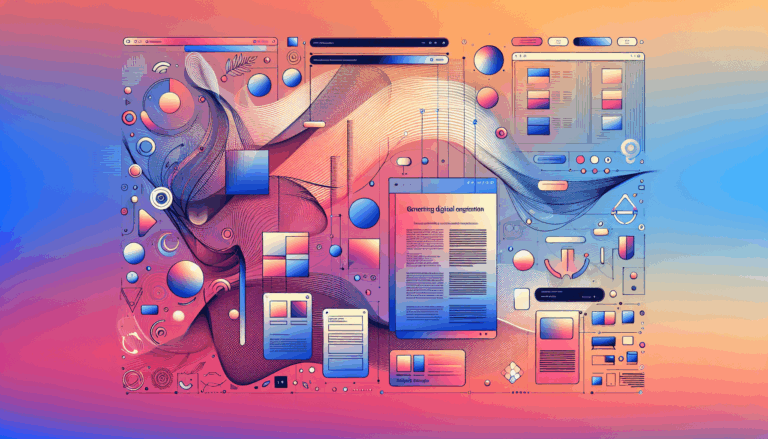Quantum-Enhanced Animations in WordPress
Elevating User Experience with Quantum-Enhanced Animations in WordPress
In the ever-evolving landscape of web design, animations play a crucial role in enhancing user engagement and site aesthetics. For WordPress users, integrating advanced animations can be a game-changer, especially when combined with the power of quantum-enhanced techniques. Here’s a deep dive into how you can leverage these technologies to create stunning, high-performance WordPress sites.
The Role of Animations in Web Design
Animations are no longer just a decorative element; they are a key component in modern web design. They can guide the user’s attention, enhance the first impression, and create a more interactive and engaging experience. Tools like Motion.Page and Lottie Animations make it easier than ever to incorporate animations into your WordPress site without requiring extensive coding knowledge.
Introduction to Quantum-Enhanced Animations
The term “quantum-enhanced” in this context refers to the use of advanced technologies and methodologies that optimize performance and user experience. This includes leveraging tools like the GreenSock Animation Platform (GSAP) and integrating headless CMS solutions.
GSAP and Motion.Page
GSAP is a powerful JavaScript library that enables sophisticated web animations. Motion.Page integrates GSAP into WordPress, allowing users to create complex animations and timelines without writing code. This plugin offers features like scroll-based animations, mouse movement triggers, and page transitions, all of which can be managed through a user-friendly visual builder.
Enhancing Performance with Headless WordPress
One of the key challenges in adding animations to a WordPress site is ensuring that performance is not compromised. A headless WordPress setup, as seen in projects like Quantum WordPress, can significantly improve site speed and efficiency.
Incremental Static Regeneration
Headless WordPress solutions often utilize incremental static regeneration (ISR), which allows for fast page loads without the expense of server-side rendering (SSR). This approach, combined with frameworks like Next.js and React, ensures that your site remains fast and responsive even with complex animations.
Integrating Animations with Figma Designs
For designers who use Figma2WP Service to convert their Figma designs into WordPress sites, integrating quantum-enhanced animations can be a seamless process.
Designing Animations in Figma
Before converting your design to WordPress, you can plan and visualize your animations within Figma. This involves creating mockups that include animation triggers and effects, which can then be translated into real animations using tools like Motion.Page.
Converting Figma Designs to Animated WordPress Sites
The Figma2WP Service allows you to convert your Figma designs into fully functional WordPress sites. By integrating plugins like Motion.Page during this process, you can ensure that your animations are perfectly aligned with your original design intent.
Real-World Examples and Case Studies
Salient Theme and Lottie Animations
The Salient WordPress theme is a great example of how Lottie animations can be seamlessly integrated into a WordPress site. This theme allows users to fine-tune animation functionality directly from the page builder, adding advanced interactivity based on scroll or hover positions.
Motion.Page in Action
Companies like Jointlymedia have successfully used Motion.Page to enhance their WordPress sites with sophisticated animations. The plugin’s user-friendly interface and powerful features have made it easier for designers to create engaging and interactive web experiences without extensive coding knowledge.
Getting Started with Quantum-Enhanced Animations
Installing Motion.Page
To start creating quantum-enhanced animations, you need to install the Motion.Page plugin. This involves downloading the plugin from the official website, uploading it to your WordPress dashboard, and activating it. Once installed, you can access the Motion.Page dashboard to start creating your animations.
Setting Up a Headless WordPress Environment
For those interested in a headless WordPress setup, you can follow the steps outlined in the Quantum WordPress repository. This involves installing necessary plugins like WPGraphQL, setting up environment variables, and running Next.js in development mode.
Frequently Asked Questions
What is Motion.Page?
Motion.Page is a WordPress plugin that allows users to create advanced animations and interactions on their websites without needing to write code. It leverages the GreenSock Animation Platform (GSAP) to empower users to animate elements on their WordPress sites easily.
How Does a Headless WordPress Setup Impact Performance?
A headless WordPress setup, combined with incremental static regeneration, significantly improves site performance. This approach ensures fast page loads and efficient rendering, even with complex animations and interactions.
Can I Use Motion.Page with Any WordPress Theme?
Yes, Motion.Page is designed to be compatible with any WordPress theme, providing flexibility in enhancing your site’s animations and interactions. This includes popular page builders like Elementor, Oxygen Builder, and Gutenberg.
Conclusion and Next Steps
Quantum-enhanced animations offer a powerful way to elevate the user experience on your WordPress site. By leveraging tools like Motion.Page and integrating headless CMS solutions, you can create stunning, high-performance websites that engage and captivate your audience.
If you’re looking to transform your WordPress site with advanced animations, consider reaching out to the Figma2WP Service to ensure a seamless transition from design to live site. With the right tools and methodologies, you can create a website that stands out in terms of both aesthetics and performance.
More From Our Blog
Crafting Cutting-Edge Publication Sites with Figma Layout Design Designing a sleek and functional publication site has become more accessible than ever, thanks to powerful design tools like Figma and specialized services such as the Figma2WP Service. These platforms enable designers and developers to collaborate seamlessly, transforming creative figma layout designs into fully operational WordPress websites, Read more…
Crafting Engaging Media Portals with Effective Article Design Creating a compelling media portal today demands exceptional attention to both aesthetics and functionality. The design of article pages, user navigation, and responsiveness play a decisive role in reader engagement and retention. Especially when it comes to transforming designs from platforms like Figma into fully functional WordPress Read more…


